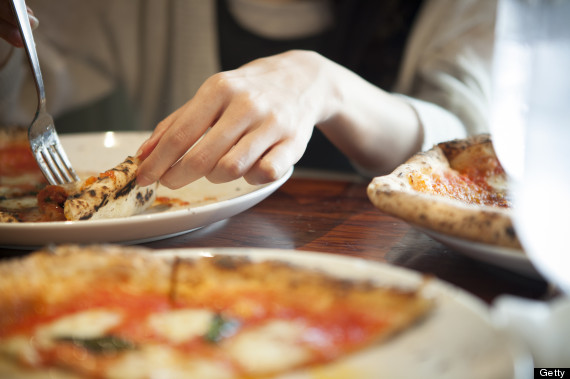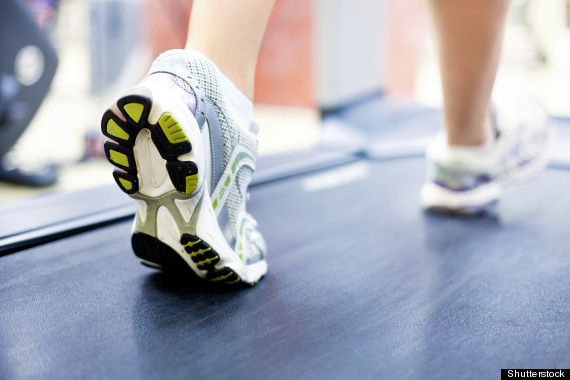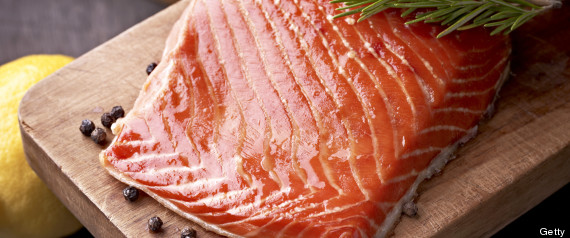If we had a penny for every time we or a friend said: "I'm going to the gym loads but not really losing any weight" we'd have well, a lot of pennies. And new research has revealed the reason why.
It's common sense, really, but we're rewarding ourselves with all the wrong types of food or underestimating how many calories a food stuff has.
A report by the University of Washington's Institute for Health Metrics and Evaluation reported The Daily Mail, found that although Americans say they are more active, it has not impacted the obesity epidemic much. The findings from the US-based study can be applied to Britain as like the US, more than one third of adults are obese.

Dr Khandee Ahnaimugan, weight loss expert and author of Slim and Healthy without Dieting: The Weight Loss Solution for Women over 40 says: "A big mistake people often make is "rewarding" themselves after a workout with food or drink. You might burn 300 calories after a 3-mile run, but then have a large latte which might be 350 calories, or a 500 calorie muffin. You can easily completely cancel out the workout benefit with a poorly chosen "reward"."
"There's a war between exercise and nutrition in our heads," said Jonathan Ross, spokesperson for the American Council on Exercise, talking to Reuters Health. "People tend to overestimate the amount of physical activity they get. They work out a little bit and treat themselves a lot. We put exercise in a box and once that exercise box is filled in we don't do much the rest of the day."
How Much Exercise You Need To Work Off The Following Foods: Big Mac (560 cal): 50 minutes of running Coca Cola (140 cal): 12 minutes of running 1 piece of Godiva chocolate (110 cal): 10 minutes of running Ice cream (201 cal): 18 minutes of running Glass of 175ml white wine: 20 minutes of aerobics
(Source: The Daily Mail/ Critical Bench)
Part of the problem in Britain may be when people misintepret the official guidelines for keeping fit. The NHS recommends 150 minutes a week or 20 minutes a day, however this is with regards to maintaining weight as opposed to losing weight.

There is also a disconnect with the amount of time we spend in the gym and the calories we're working off, compared with what we then eat for dinner afterwards. To successfully lose weight, a person needs to create a calorie deficit - that is, consuming fewer calories than their body needs for the day. If you eat, say, a pizza for dinner after a workout, you would have had to cycle for an hour in the gym for the calories to cancel themselves out.
The 'box-ticking' that Ross is referring to is supported by the news that our increasingly sedentary lifestyles means we are finding it harder to lose weight, and as a result we are gaining roughly a quarter of a kilogram each year.
The 'denial' about calorie intake was highlighted perfectly in the Channel Four programme Secret Eaters, which looked at overweight families and their eating habits.
Most families are 'mystified' as to how they are gaining weight, but a closer look at their diet reveals that they either aren't aware of how many calories are contained in certain types of foods or they indulge in practices like eating while standing up or in front of the fridge, so the brain finds it harder to register that the body has eaten.
So what should you eat after a workout?
Bodydoctor and celebrity fitness trainer David Marshall says: "My philosophy when you exercise is that you work muscles, and muscles are made of protein, If you don't replenish your protein after 90 minutes, you miss the window. You can have a protein shake or good quality protein such as meat, fish, chicken, eggs, and if you're vegetarian - pulses."

Sam Feltham, health expert, says: "My favourite meal after a workout is my healthy fish and chips. Mackerel fillets, avocado chips and mashed peas with butter. Plenty of omega 3 fatty acids to improve body fat burning alongside a good amount of protein to rebuild muscle."
 RSS Feed
RSS Feed Twitter
Twitter 06:54
06:54
 Max
Max
 Posted in
Posted in